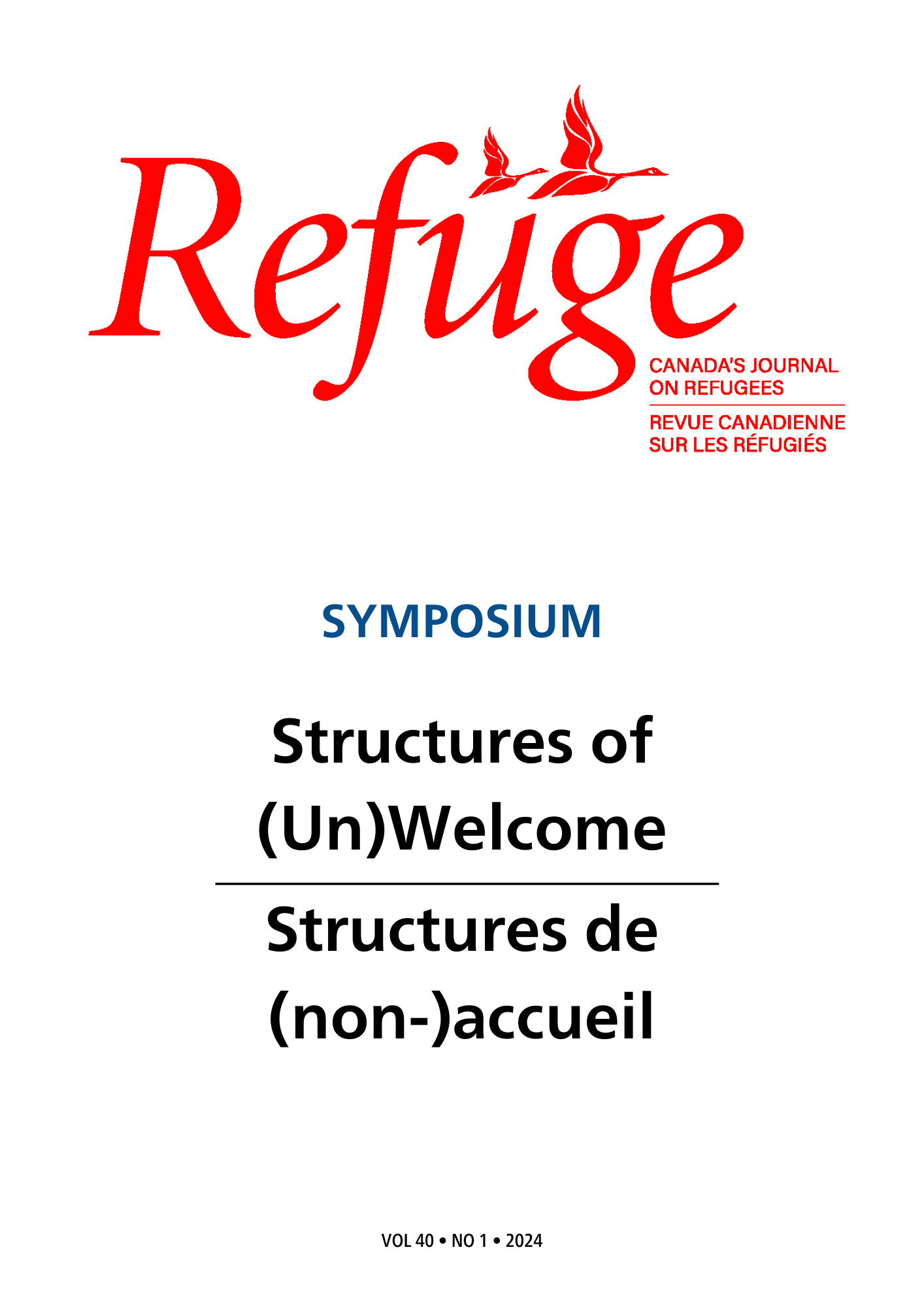Children and Youths’ Belonging in Protracted Displacement: A Mixed-Methods Study from Kakuma Refugee Camp
DOI :
https://doi.org/10.25071/1920-7336.41205Mots-clés :
belonging, pragmatics of belonging, home, refugee youth, Kakuma Refugee CampRésumé
Des millions d’enfants et de jeunes vivent en situation de déplacement forcé. Nous avons mené une étude mixte auprès de 729 élèves du primaire dans le camp de réfugiés de Kakuma afin d’examiner le rôle des connaissances, de l’expérience (directe ou indirecte), de la langue et de la scolarité dans le sentiment d’appartenance des élèves à leur pays d’origine et dans leur intention d’y retourner. Nous avons constaté que le sentiment d’appartenance est associé à la connaissance du pays et de ses traditions, à la maîtrise de la langue d’origine et aux perspectives de scolarisation. Toutefois, ces mêmes facteurs sont associés négativement à leur intention de retourner dans leur pays d’origine dans un avenir proche. La relation entre l’apprentissage formel et informel semble encourager un sentiment pragmatique d’appartenance au Kenya dans l’immédiat, tandis que tout sentiment d’appartenance et tout espoir de retour dans leur pays d’origine sont projetés dans un avenir imaginé.
Statistiques
Références
Al-Ali, N., & Koser, K. (2002). New approaches to migration? Transnational communities and the transformation of future. Routledge. https://doi.org/10.4324/9780203167144
Anderson, B. (1991). Imagined communities: Reflections on the origin and spread of nationalism (Rev. ed.). Verso.
Antonsich, M. (2010). Searching for belonging—An analytical framework. Geography Compass, 4(6), 644–659. https://doi.org/10.1111/j.1749-8198.2009.00317.x
Arvanitis, E., & Yelland, N. (2021). “Home means everything to me…”: A study of young Syrian refugees’ narratives constructing home in Greece. Journal of Refugee Studies, 34(1), 535–554. https://doi.org/10.1093/jrs/fez030
Bellino, M. J. (2018). Youth aspirations in Kakuma Refugee Camp: Education as a means for social, spatial, and economic (im)mobility. Globalisation, Societies and Education, 16(4), 541–556. https://doi.org/10.1080/14767724.2018.1512049
Brown, J. (2011). Expressions of diasporic belonging: The divergent emotional geographies of Britain’s Polish communities. Emotion, Space and Society, 4(4), 229–237. https://doi.org/10.1016/j.emospa.2011.01.004
Brun, C., & Fábos, A. (2015). Making homes in limbo? A conceptual framework. Refuge: Canada’s Journal on Refugees, 31(1), 5–17 . https://doi.org/10.25071/1920-7336.40138
Buckner, E., Spencer, D., & Cha, J. (2018). Between policy and practice: The education of Syrian refugees in Lebanon. Journal of Refugee Studies, 31(4), 444–465. https://doi.org/10.1093/jrs/fex027
Cha, J. (2020). Refugee students’ academic motivation in displacement: The case of Kakuma refugee camp. Journal on Education in Emergencies, 5(2),108-46. https://doi.org/10.33682/pe90-33g2
Devictor, X., & Do, Q. T. (2017). How many years have refugees been in exile? Population and Development Review, 43(2), 355–369. https://doi.org/10.1111/padr.12061
Dewey, J. (1929). The quest for certainty. Minton, Balch.
Dromgold-Sermen, M. S. (2022). Forced migrants and secure belonging: A case study of Syrian refugees resettled in the United States. Journal of Ethnic and Migration Studies, 48(3), 635–654. https://doi.org/10.1080/1369183X.2020.1854087
Dryden-Peterson, S. (2017). Refugee education: Education for an unknowable future. Curriculum Inquiry, 47(1), 14–24. https://doi.org/10.1080/03626784.2016.1255935
Dryden-Peterson, S., Adelman, E., Bellino, M. J., & Chopra, V. (2019). The purposes of refugee education. Sociology of Education, 92(4), 346–366. https://doi.org/10.1177/0038040719863054
Fenster, T. (2005). The right to the gendered city: Different formations of belonging in everyday life. Journal of Gender Studies, 14(3), 217–231. https://doi.org/10.1080/09589230500264109
Fincham, K. (2012). Learning the nation in exile: Constructing youth identities, belonging and “citizenship” in Palestinian refugee camps in South Lebanon. Comparative Education, 48(1), 119–133. https://doi.org/10.1080/03050068.2011.637767
FitzGerald, D. S., & Arar, R. (2018). The sociology of refugee migration. Annual Review of Sociology, 44, 387–406. https://doi.org/10.1146/annurev-soc-073117-041204
Geddes, A., & Favell, A. (1999). Introduction. In A. Geddes & A. Favell (Eds.), The politics of belonging: Migrants and minorities in contemporary Europe (pp. 10–14). Ashgate.
hooks, b. (2009). Belonging: A culture of place. Routledge. https://doi.org/10.4324/9780203888018
Marlowe, J. (2018). Belonging and transnational refugee settlement: Unsettling the everyday and the extraordinary. Routledge. http://doi.org/10.4324/9781315268958
Mason, V. (2007). Children of the “idea of Palestine”: Negotiating identity, belonging and home in the Palestinian diaspora. Journal of Intercultural Studies, 28(3), 271–285. https://doi.org/10.1080/07256860701429709
Miletzki, J. L. (2014). Waiting for citizenship: Pragmatics of belonging of Burundian refugees in protracted exile. The case of Ulyankulu settlement, Tanzania [Doctoral Dissertation, London School of Economics and Political Science]. LSE Theses Online. http://etheses.lse.ac.uk/id/eprint/3151
Morley, D. (2001). Belongings: Place, space and identity in a mediated world. European Journal of Cultural Studies, 4(4), 425–448. https://doi.org/10.1177/136754940100400404
Perez Murcia, L. E. (2019). Where the heart is and where it hurts: Conceptions of home for people fleeing conflict. Refugee Survey Quarterly, 38(2), 139–158. https://doi.org/10.1093/rsq/hdz00
Saldaña, J. (2021). The coding manual for qualitative researchers. Sage Publications.
Schachter, A. (2016). From “different” to “similar”: An experimental approach to understanding assimilation. American Sociological Review, 81(5), 981–1013. https://doi.org/10.1177/0003122416659248
Taylor, H. (2009). Narratives of loss, longing and daily life: The meaning of home for Cypriot refugees in London [Doctoral dissertation, University of East London]. UEL Research Repository. https://doi.org/10.15123/PUB.3928
Taylor, H. (2013). Refugees, the state and the concept of home. Refugee Survey Quarterly, 32(2), 130–152. https://doi.org/10.1093/rsq/hdt004
Taylor, H. (2015). Refugees and the meaning of home: Cypriot narratives of loss, longing and daily life in London. Springer. https://doi.org/10.1057/9781137553331
UNHCR. (2019, September 30). Statistical summary: Refugees and asylum seekers in Kenya. https://www.unhcr.org/ke/wp-content/uploads/sites/2/2019/11/Kenya-Statistics-Package-30-September-2019.pdf
UNHCR. (2023, October 24). Refugee data finder. https://www.unhcr.org/refugee-statistics/
Wilkinson, J., & Lloyd-Zantiotis, A. (2017). The role of everyday spaces of learning for refugee youth. In R. M. Elmesky, C. Camp Yeakey, & O. Marcucci (Eds.), Advances in education in diverse communities, Vol. 12. The power of resistance (pp. 383–408). Emerald Publishing. https://doi.org/10.1108/S1479-358X20140000012018
Yuval-Davis, N. (2006). Belonging and the politics of belonging. Patterns of Prejudice, 40(3), 197–214. https://doi.org/10.1080/00313220600769331
Téléchargements
Publié-e
Comment citer
Numéro
Rubrique
Licence
© Jihae Cha, Daniel Shephard, Minkyung Choi, Ahrum Jeon 2024

Cette œuvre est sous licence Creative Commons Attribution - Pas d'Utilisation Commerciale 4.0 International.
Les auteurs qui publient dans Refuge conservent le droit d’auteur associé à leur œuvre, et octroient au public une licence Creative Commons Attribution - Utilisation non commerciale 4.0 International. La licence permet l’utilisation, la reproduction et l’adaptation du matériel avec attribution par tous moyens et sous tous formats pour des fins non commerciales. Pour des informations générales sur les licences Creative Commons, visitez le site Creative Commons. Pour la licence CC BY-NC 4.0, consultez le résumé lisible par l'homme.







